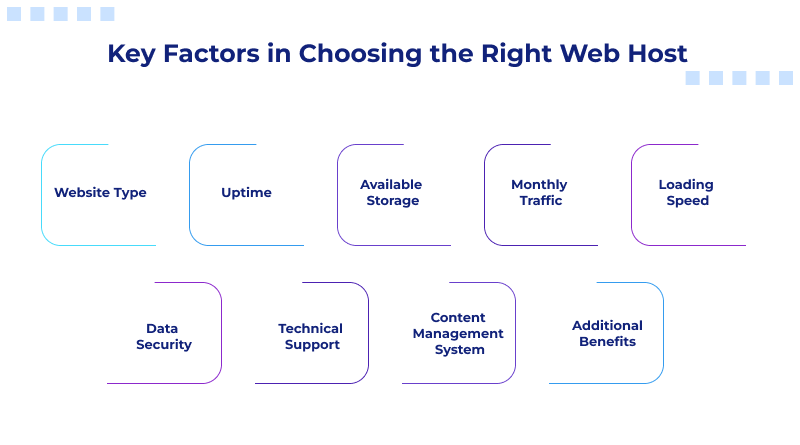Your web host is more than just a service—it forms the foundation that fuels your online growth, security, and success.
It’s no secret that websites are integral for any online business seeking success in today’s tech-driven world. They provide a seamless way to interact with the audience, spreading ideas and delivering value.
Whether you are looking to build an online store or turn your dream project to life, you have likely faced the critical question: how do successful startups choose the best web hosting provider?
With numerous options available, the decision can be overwhelming. Apart from worrying about web design and content, startups often struggle to determine which web host best meets their website needs, especially when choosing the right WordPress hosting.
Along with the web design and content, aspiring business owners often get confused about which company to rely on for deploying their website. You must compare various services and select the one that best fits your business objective. In this article, we highlight the essential factors to help you choose the right web hosting service for your business.
Table Of Content
Key Factors in Choosing the Right Web Host

1. Website Type
The fundamental step is to determine the type of your website. Ensure that the web host has experience in hosting businesses like yours. If you have an e-commerce store, you will need to evaluate performance, network latency, the ability to execute background operations, and fast front-end delivery. This will enable your website to perform effectively while being professional and efficient in operation.
2. Uptime
There is nothing more annoying on the web than clicking on a link that takes ages to load. This problem not only frustrates visitors but also hurts search engine rankings; this is why uptime is a key hosting criteria. So make sure that the website hosting provider you choose offers an exceptional level of availability. A higher percentage means greater reliability in service availability. When selecting the best web hosting company, keep track of this and prioritize options that offer uptime above 99%.
3. Available Storage
Your storage needs depend on your website’s purpose and the type of files you’ll be hosting. Regardless of your case, it’s always recommended that you pick a service that best suits your needs while ensuring startup scalability.
If you require a lot of space, ensure that the web hosting solution provides the amount you need to avoid running out of memory. Or, if you require less, go for cheaper plans and save money that would otherwise be spent on unnecessary space.
4. Monthly Traffic
You might not be aware, but some web hosting companies have a monthly traffic limit. This means that after a particular level of access, the server will either charge an extra fee for additional visitors or stop showing your website online.
So, pay close attention to the details provided by hosting providers and opt for those offering unlimited bandwidth to avoid unexpected downtime.
5. Loading Speed
If you are proficient in SEO, you must be aware of the fact that Google prefers pages that load quickly, to offer the best experience for its clients.
So, examine whether the web hosting platform you are choosing offers a decent website speed. It may seem a trivial difference; however, in reality, it can determine whether a user stays engaged or leaves due to slow loading time.
6. Data Security
A good web hosting provider should take utmost care to use encryption technology to provide secure interaction between servers and clients, as well as between your business server and the web host server. This step is important to protect your data from online hackers.
- SSL Certificate: Secure Socket Layer (SSL) certificates facilitate the encryption of data being transferred between your web server and the client’s web browsers. Installing SSL certificates can help secure your client’s sensitive data from being compromised.
- Antivirus Scanner: An antivirus plays a key role in recognizing and mitigating any harmful software that could potentially affect your website, ensuring content security and integrity.
- Firewall: A firewall functions as a proactive barrier that blocks illicit access and prevents online attacks. By deploying a firewall, business owners can seamlessly amplify the website’s security and enhance its overall protection.
- DDoS Protection: Distributed Denial-of-Service (DDoS) mitigation measures are crafted to prevent attackers from draining your server resources and causing downtime. Deploying DDoS mitigation strategies can safeguard your website against such attacks.
Hence, you have to make sure that the chosen provider ensures enhanced security, data redundancy, and periodic backups. This assures that your website remains fully functional, regardless of any interruptions.
7. Technical Support
An ideal hosting provider not only supports your website’s success but also offers comprehensive technical support. Client support is a decisive factor for many, and the provider’s accessibility to assist clients can be the difference between a crisis resolved quickly or a website being down for several hours. Analyze how the level of service you have chosen works and see which gateways the company provides for contacting support.
8. Payment Methods
The cost should not dictate your preference when opting for the service; however, it can help you make a well-informed decision. A moderate price doesn’t always mean poor quality, just like a higher price doesn’t always ensure superior quality. Assess your needs and look out for a plan that favours your business objectives and budget.
If you’re setting up a simple webpage with low traffic, choosing an inexpensive plan should be adequate. However, if you have a more complex website with additional features and functionalities, considering other factors becomes crucial. In such scenarios, emphasizing server reliability and choosing the web host that meets your specific needs is vital.
Keep in mind that many website hosting services also provide discounts depending on the period you choose to subscribe. Usually, the longer the usage duration, the lower the final price you will pay.
9. Content Management System
Choose a hosting platform that provides its content management system or seamless installation of an open-source one, such as WordPress, Joomla, or Magento, along with reliable technical support. You will use these platforms daily to manage your website, so consider this, especially if you aim to create content frequently.
10. Additional Benefits
The majority of web hosting providers offer free usage for the user to test the web hosting services and check if they meet their needs. This duration is necessary to find out potential issues that may not have been considered before implementing your vision into reality. If the provider does not match your needs, you can leave for free. If it does— great! You’ve found the perfect hosting.
Since this is an immensely competitive marketplace, it’s worth noting that many organizations offer website hosting services. To stand out, they generally offer alluring perks like free domain names, email accounts, and much more to excel the competition. Thus, it’s essential to stay alert. Verify everything included in each plan and recognize benefits that align with your needs.
Web Hosting Comparison: Features & Pricing
Here’s a quick comparison of top hosting providers,highlighting the key features like pricing, uptime, free benefits, and performance boosters to help you choose wisely.
| Price (£/mo) | Uptime Guarantee | Free Domain | Free Migration | NVMe Storage | CDN Integration | SSH Access | Money-Back Guarantee | |
| MilesWeb | £2.40/mo | 99.95% | ✅ | ✅ | ✅ | ✅ | ✅ | 30 Days |
| HostGator | £2.75/mo | 99.90% | ✅ | ❌ | ✅ | ✅ | ✅ | 45 Days |
| Hostinger | £1.49/mo | 99.90% | ❌ | ✅ | ❌ | ✅ | ❌ | 30 Days |
| DreamHost | $2.95/mo | 99.90% | ✅ | ❌ | ❌ | ❌ | ✅ | 97 Days |
| GoDaddy | £3.99/mo | 99.90% | ✅ | ❌ | ✅ | ✅ | ✅ | 30 Days |
| SiteGround | £2.99/mo | 99.99% | ❌ | ❌ | ❌ | ✅ | ✅ | 30 Days |
A startup’s journey begins with wise decisions—and choosing the right web hosting service is one such decision. Take a strategic approach—consider beyond uptime, security and price point—prioritize reliability, speed and scalability.
The right hosting service won’t only have your website up and running; it will provide the stability and performance required to stand out and grow.
With regular monitoring, optimization, and smart utilization of benchmarking and analytics, business organizations can turn their hosting environment into a strategic resource for optimizing profitability.
FAQs
1. What factors did successful startups prioritize when choosing a web hosting provider?
Startups didn’t select the first web host they came across—they sought reliability, speed, security, and scalability. A fast-loading website that remains online gives users confidence. They also ensured the host had good customer support because when things go wrong, having quick assistance is a lifesaver.
2. How important is server reliability and uptime for a growing startup?
Extremely critical! If your website continues crashing or taking too long to load, potential buyers won’t wait around—they’ll go to the next option. That’s why startups opted for providers like MilesWeb, which promises 99.95% uptime. A reliable website ensures continuous business, improved customer experience, and no lost sales due to downtime.
3. How did successful startups align their hosting needs with their budget?
Successful startups didn’t overspend on the lowest-cost option, but they didn’t spend more than necessary on things they didn’t require. Most began with a basic plan and upgraded as their traffic increased. They also took care to find long-term discounts and bundled deals to save money while ensuring their website had the resources it needed to do well.
4. What steps did successful startups take to compare hosting providers?
They did their research! Rather than selecting a web host blindly, they go through actual user feedback, tested customer support, and reviewed uptime guarantees. They also checked how smoothly they could upgrade plans when required to avoid switching hosts as their business expanded.








